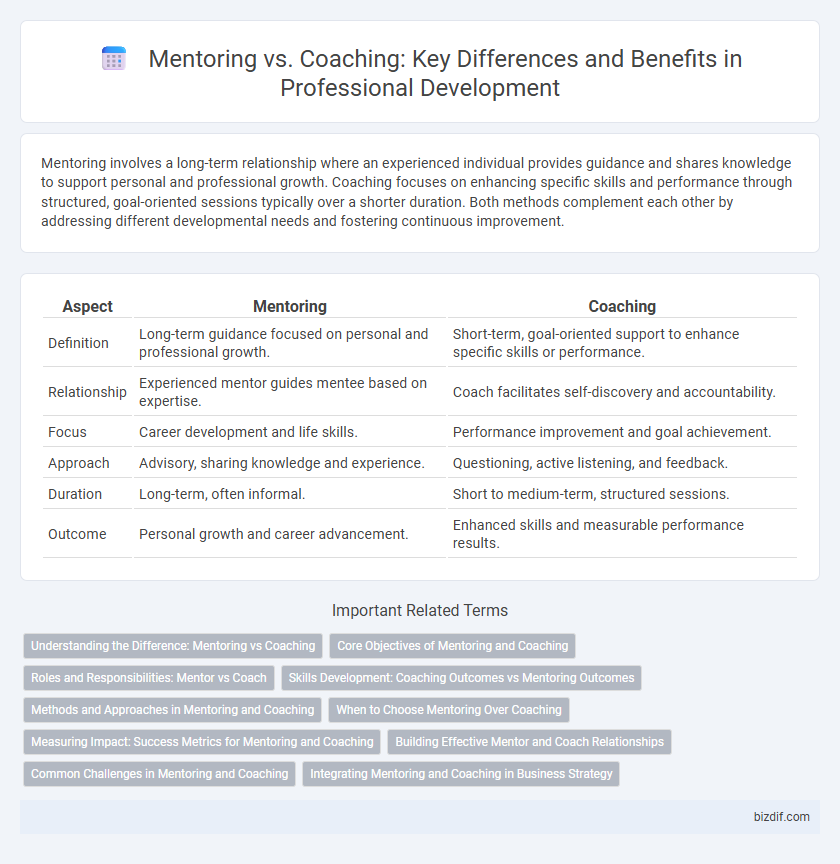Mentoring involves a long-term relationship where an experienced individual provides guidance and shares knowledge to support personal and professional growth. Coaching focuses on enhancing specific skills and performance through structured, goal-oriented sessions typically over a shorter duration. Both methods complement each other by addressing different developmental needs and fostering continuous improvement.
Table of Comparison
| Aspect | Mentoring | Coaching |
|---|---|---|
| Definition | Long-term guidance focused on personal and professional growth. | Short-term, goal-oriented support to enhance specific skills or performance. |
| Relationship | Experienced mentor guides mentee based on expertise. | Coach facilitates self-discovery and accountability. |
| Focus | Career development and life skills. | Performance improvement and goal achievement. |
| Approach | Advisory, sharing knowledge and experience. | Questioning, active listening, and feedback. |
| Duration | Long-term, often informal. | Short to medium-term, structured sessions. |
| Outcome | Personal growth and career advancement. | Enhanced skills and measurable performance results. |
Understanding the Difference: Mentoring vs Coaching
Mentoring involves a long-term relationship focused on personal and professional growth, where an experienced mentor shares knowledge and guidance based on their expertise. Coaching is typically shorter-term, goal-oriented, and performance-driven, emphasizing skill development and achieving specific outcomes through structured sessions. Understanding these distinctions helps organizations and individuals select the right approach to support development effectively.
Core Objectives of Mentoring and Coaching
Mentoring focuses on long-term personal and professional development by providing guidance, support, and knowledge transfer from an experienced mentor to a mentee. Coaching emphasizes enhancing specific skills, performance improvement, and goal attainment through structured conversations and feedback processes. Both approaches aim to unlock potential but differ in scope, with mentoring fostering overall growth and coaching targeting immediate results.
Roles and Responsibilities: Mentor vs Coach
Mentors provide guidance by sharing their experience and wisdom to help mentees navigate career paths and personal growth, acting as trusted advisors. Coaches focus on enhancing performance and developing specific skills through tailored questioning and goal-setting, promoting self-discovery and accountability. While mentors often offer long-term support and holistic development, coaches maintain a structured, short-term approach centered on achieving measurable outcomes.
Skills Development: Coaching Outcomes vs Mentoring Outcomes
Coaching outcomes primarily focus on enhancing specific skills through structured guidance, goal-setting, and performance feedback, leading to measurable improvements in competencies and professional abilities. Mentoring outcomes emphasize long-term personal and professional growth by offering wisdom, experience-based insights, and network development, fostering career advancement and holistic development. Both approaches contribute to skills development but differ in intensity, scope, and immediacy of impact on performance.
Methods and Approaches in Mentoring and Coaching
Mentoring typically employs a relationship-driven, long-term approach focused on guidance, experience sharing, and personal development through storytelling and role modeling. Coaching uses goal-oriented, structured techniques such as powerful questioning, active listening, and feedback to enhance performance and unlock potential in a shorter timeframe. While mentoring emphasizes wisdom transfer and nurturing, coaching prioritizes skill building and behavioral change through tailored sessions.
When to Choose Mentoring Over Coaching
Choose mentoring over coaching when seeking long-term personal and professional growth through guidance from an experienced individual who shares industry insights and wisdom. Mentoring is ideal for career development, networking, and skill-building in complex or evolving roles requiring ongoing support and relationship-building. Coaching suits situations targeting specific skills or performance goals, while mentoring benefits those needing broader developmental perspectives and emotional support.
Measuring Impact: Success Metrics for Mentoring and Coaching
Success metrics for mentoring focus on mentee growth indicators such as skill acquisition, confidence improvement, and career progression, often tracked through qualitative feedback and goal achievement rates. Coaching impact is measured by performance enhancements, behavioral changes, and quantifiable outcomes like productivity increases or leadership effectiveness, using tools like 360-degree assessments and key performance indicators (KPIs). Both approaches benefit from longitudinal tracking to evaluate sustained development and organizational return on investment (ROI).
Building Effective Mentor and Coach Relationships
Building effective mentor and coach relationships requires clear communication, mutual trust, and goal alignment to foster growth and development. Mentors offer guidance based on experience and long-term career insights, while coaches focus on enhancing specific skills and performance through structured feedback. Combining both approaches accelerates personal and professional progress, creating a supportive environment for continuous learning.
Common Challenges in Mentoring and Coaching
Common challenges in mentoring and coaching include misaligned expectations between parties, lack of clear communication, and inconsistent engagement or commitment. Mentors often struggle with balancing guidance without fostering dependence, while coaches face difficulties in adapting techniques to diverse learning styles. Both roles demand ongoing effort to build trust and measure progress effectively for successful development outcomes.
Integrating Mentoring and Coaching in Business Strategy
Integrating mentoring and coaching within business strategy enhances employee development by combining long-term guidance with targeted performance improvement. Mentoring fosters knowledge transfer and cultural alignment, while coaching drives specific skill acquisition and accountability. Leveraging both approaches creates a comprehensive talent development framework that accelerates organizational growth and leadership effectiveness.
Mentoring vs Coaching Infographic

 bizdif.com
bizdif.com